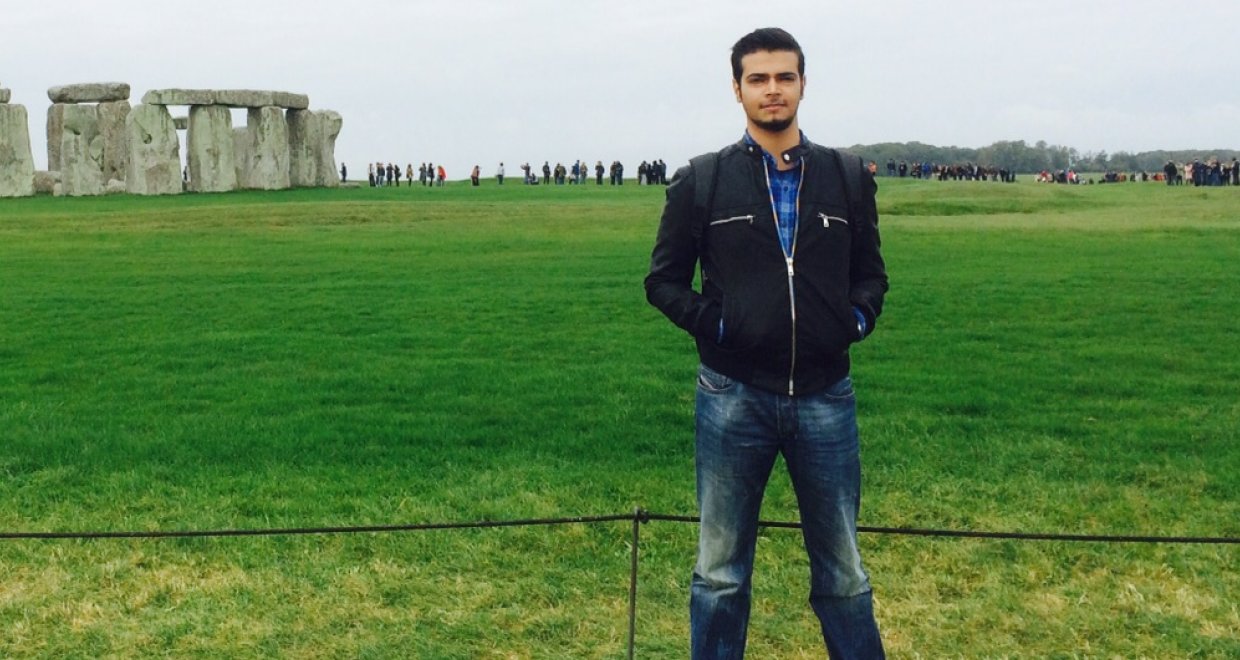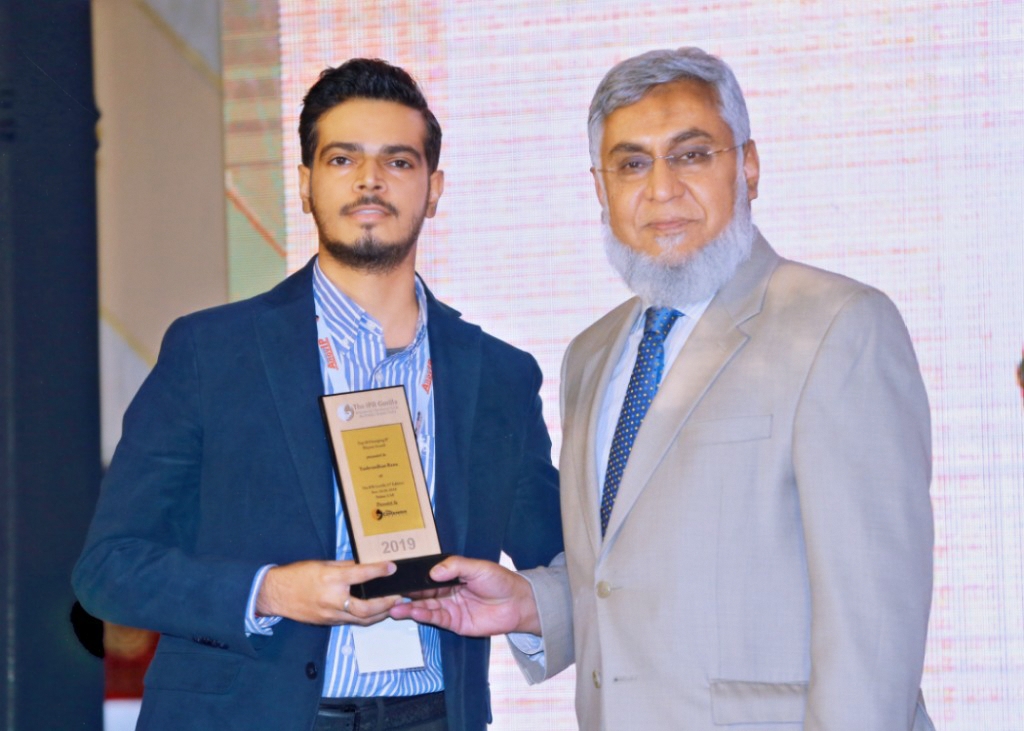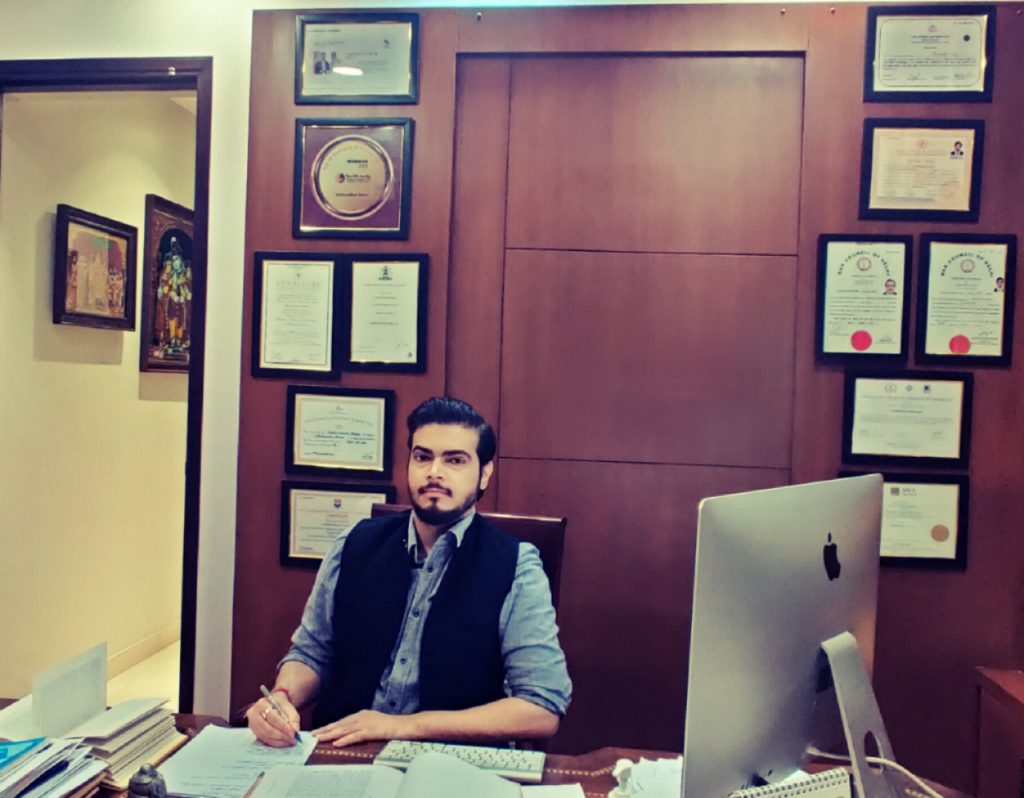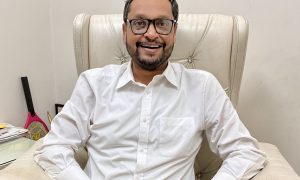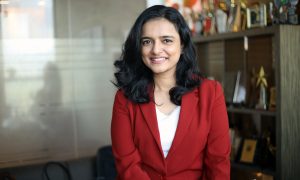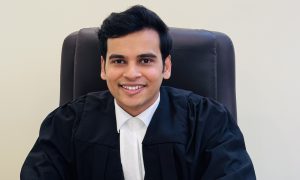Yashvardhan Rana graduated from Symbiosis Law College, Pune in the year 2013 after which he pursued LLM in IPR from QMUL. He also pursued a certificate course in International Commercial Litigation and Arbitration from London School of Economics and Political Science. He is currently working with Inttl Advocare as an Associate.
In this interview we speak to him about:
- His Master’s degree from QMUL, London;
- Tips on application requirements, procedure and writing SOPs;
- His role and responsibilities as Associate at Inttl Advocare
HOW WOULD YOU INTRODUCE YOURSELF TO OUR READERS?
What matters is what you are from inside not something that can be portrayed by a bunch of adjectives attached to a string of sentences. You would have all witnessed the usual introductory lines till date. By now you must be thinking that I am trying to be different from my peers. But NO. I wouldn’t pull of some set of words out of my hat to describe myself and ask for your indulgence to know about me, but rather I would like to draw your attention to the various experiences that have shaped me as a human being. Human, first. Being myself, later. Being Human, is it? To cut the long story short – a hard worker like everyone else (smart work is the “in” thing – getting there..), believer of karma, football fanatic, adventure sports enthusiast, a law abiding citizen of this country – leaving out the sins committed in college life and the one who manages to show his passion for the world and for exploring it. Above all, what matters is how much you give back to the society (in terms of bringing about social impact and attitudinal change across all sectors), how much name and fame one can accumulate – social status, and the color of money you’ve stacked up for your descendants. Out of all the aforementioned indicators, I stand pretty meek as compared to the visionaries out there.
WHY DIDN’T YOU OPT FOR THE CONVENTIONAL DEGREES IN ENGINEERING OR MEDICINE?
“Have you got what it takes to lead in a diverse world?” Well, to start off with I chose law as my undergraduate degree to enrich myself of varied laws governing us and but of course – analytical skills.
My academic and professional choices were driven by my continuous search for a fulfilling academic and professional life and what better way to take the path of law as opposed to the conventional degrees in Engineering or Medicine – as rightly pointed out. One other major factor was the sight of my father all dressed up as a lawyer and witnessing his gleaming personality – day in and day out since boyhood. My father’s hard labor and his savoir faire as an advocate appealed to my childhood dreams. My perspective on life changed when I closely observed my father, Mr. Mahendra Rana, work as an advocate in his Delhi High Court chambers and the one attached to our house.
My entrance into this profession began after pursuing B.B.A., LL.B. (five year integrate course) from my Alma meter Symbiosis Law School, Pune in the year 2008. My yearning for specialised legal knowledge persuaded me to attain an LL.M. from Queen Mary, University of London, one of the top universities in the World in the field of Intellectual Property Law.
ARE THERE ANY MEMORABLE MOMENTS OF LAW SCHOOL, WHICH YOU WOULD LIKE TO SHARE?
I wish I could travel back in time to be with my friends with whom I cherish fond memories. At the risk of stating the obvious, I would say I had the time of my life at college. Not only because Symbi is a very good academic institution, but especially the diverse culture, unrestricted environment and the open-mindedness to learn which helped us to assimilate over a period of 5 years, was second to none. I was an introvert before college; the place played an important role in shaping my individuality, ethics, and set of values. I particularly savor the amiable camaraderie, especially at display in our apartments and college canteen (also the one at yards length from our college); all of us would bond together with our collaborative efforts through the chaos of assignment submissions and last minute exam preparations. I owe a lot of credit to these beautiful people for what I am today.
HOW WAS YOUR FIRST YEAR AFTER GRADUATION AND WHAT WERE THE CHALLENGES THAT YOU FACED AS A YOUNG ASSOCIATE?
In our ever-more inter-disciplinary world, innovations and laws inform and influence each other, ultimately emerging in response to each other. Generally speaking, Law is an ever-evolving subject of expertise and it takes a few months before a fresh graduate is of any use for an experienced lawyer. There is a fair bit of truth in the first half of this reason. The irony however is that the Bar Council of India, which is a body of several accomplished lawyers, regulates law schools. So basically, lawyers decide what/how law will be taught, only to (rightly) claim later that the training imparted by a system they regulate isn’t good enough. To enter this so-called world of uncertainty, I prepared myself for this and approached the IP Law firms I had interned with along with some other notable law firms. I would say that I got lucky with the firm that I had interned with and got through that, in turn becoming a trainee associate over there for a period for 2 years approximately. I got an overview about how to climb the ropes of law and the continuous persistence required to become a successful lawyer. I was involved in matters pertaining to Trade Mark and Copyright Law particularly and from the very start I was given the chance to accustom myself of what lies ahead being thrown in the deep blue sea comprising of big fishes catering to hungry sharks involving high stake matters. I also got to brief the owners of Haldiram’s and an eminent lawyer like Mr. Shanti Bhushan, along with my senior as Mr. Amarjit Singh was unavailable and, which in itself were enriching experiences.
In the stifling hustle-bustle inside and outside the courtrooms, inspiration from stalwarts, restless clients, and legal professionals, I found my place. In countless other landmark judgments, I found my inspiration. And in the field of IP, I believe I can find the knowledge, and thus the power, to make my cause a reality.
WHAT MADE YOU GO FOR FURTHER STUDIES?
After amassing adequate knowledge about the rudiments of law through the various cases I was involved in over the first 2 years as an Associate as part of an Intellectual Property Firm, and having a small taste of how the law shapes its’ citizens, I planned to undertake a much more critical examination of the written words that were crafted to dictate our behaviour by involving myself handling varied contentious and non-contentious matters. Being fortunate enough to acquire the necessary expertise and acclimatising myself through Work experience, Diploma and Certificate courses from various avenues that beckon, I realised that I need to build up a sense of intellectual ability in me and arm myself with the various techniques of analysis and develop a sense of multi-disciplinary approach in a diverse environment that would in turn help me grow and broaden my perspective. That is what I yearned for to happen to me and to become a part of a university wherein I encountered the best minds engaged in immutable discussions whilst intrigued in understanding not just the theoretical foundations of law and society but also its new and emerging trends. This urge led me to search for an edifying journey with a stellar reputation for producing the best minds in the world of Intellectual Property Law. It did not come as much of a surprise that “Queen Mary University of London” fits that criteria, and, in one of the more surreal twists in my life, I decide to take the plunge and thus, applied for further studies.
SHARE SOME ADVICE ON ACING THE APPLICATION REQUIREMENTS AND PROCEDURE FOR QMUL?
Applying to an LL.M., whether at QMUL or elsewhere, requires some amount of dedication to craft and connect the dots. The key is just to start early (by early I mean – at the very beginning) in the admission cycle – get the referees to send in their recommendation letters (from a notable professor, judge or your college principal would go a long way) and the universities in India to send in the transcripts etc. After that, it’s about writing a solid statement of purpose. I think the SOP requires painting a vision about your future and how well you are aware on how to tread the path of endless opportunities without blinking your eye. Also, writing an SOP requires demonstration of a certain skill set, aptitude and coherence to be able to delineate and sell what you envision for in about 2-3 pages.
WHAT LED YOU TO CHOOSE IPR AS YOUR SPECIALISATION?
The world of brands have always fascinated me since my childhood as I’ve seen my father patronising various well-known brands from multifarious departmental stores in every nook and corner all over the world on his vacations (he does not like to shop in India). This routine was followed on every vacation that he took us to and I accidentally got immersed and it had further captivated me to dwell into the world of brands like never before. On another note, I also used to read his files at night in our house chamber of matters pertaining to high stake trade mark law matters almost twice or thrice a week in my college holidays. Since I also had an inclination to become a lawyer from my boyhood days and Intellectual Property Law was booming in India, I chose IPR as my specialisation and further wanted to create a niche for myself in this ever-intriguing field of law.
TELL US ABOUT YOUR INTERNATIONAL EXPOSURE AND EXPERIENCE.
In my view, it was an exhilarating experience as it broadened my horizons/perspective to a next level altogether. I met a lot of people from diverse backgrounds and countries. It also gave a deep insight into the workings of different legal regimes in different jurisdictions.
I have, and shall always maintain unconditionally, that my year as an LL.M. student at QMUL was easily one of the very best years of my life. It gave me a lot more than just a degree: I had arrived to join a year-long course and to earn myself an added qualification with an incredible enlightenment, priceless personal growth, lifelong friends and long lasting memories. Intellectually, it endlessly challenged me to simultaneously learn and unlearn, and amplified my personal growth to help birth a broader view and perception I wouldn’t hitherto have considered myself capable of.
PLEASE TELL US ABOUT YOUR CERTIFICATE COURSE IN INTERNATIONAL COMMERCIAL LITIGATION AND ARBITRATION FROM LONDON SCHOOL OF ECONOMICS AND POLITICAL SCIENCE. IS IT USEFUL IN YOUR PRACTICE.
It definitely is! I quote “It takes a distressing incident for us to step back and retrospect. Until then, we relish being one among the herd.” It feels comforting having someone resonate your outlook. It was this moment when I realized the importance of having an all-round approach when it comes to learning. The subject “International Commercial Litigation and Arbitration” per se did not directly cater to my growth as an IP lawyer; however, it invoked a sense of understanding the law in its complete sense. Litigation and Arbitration play a key role in delivering speedy justice and what better way to supplement my knowledge in IP and have an added advantage over my peers. This course offered a concise introduction to the legal challenges relating to the international dimension of litigating commercial disputes, both before state courts and in arbitration. London being one of the most important centres for commercial litigation and arbitration in the world, the course focuses on the relevant English and European Union law, invoking experiences from other jurisdictions where useful.
PLEASE TELL US HOW DID YOUR APPOINTMENT TAKE PLACE AT INTTL ADVOCARE.
I joined Inttl Advocare in April 2017 after working at Amarjit & Associates (IP Litigation) and Lall, Lahiri and Salhotra (Trade Mark prosecution department), as an Associate, Trade Mark, Copyright and Design Prosecution, and have been with this stellar firm ever since. I had zeroed down on Inttl when I was applying to the best of IP firms in India and applied without any further delay. The doyens of IP law namely – Mr. Hemant Singh, Managing Partner and Mrs. Preetika Singh, Senior Partner and Head of Trade Mark, Copyright and Design Prosecution, instilled more confidence in me to apply here blindly without taking a second opinion. Thus, I got a call from there after my interview was conducted which comprised of a basic questionnaire, writing a short essay on a contemporary topic in the field of IP Law and 2 hour long face to face interview. I assure you of that this is the best place where one can hone their skills and concepts to the maximum in the field of IP in India, thus enabling you to reach greater heights within that setup in order to deliver results effectively and efficiently in turn making you into a versatile IP Attorney.
AS AN ASSOCIATE IN INTTL ADVOCARE, WHAT ARE YOUR ROLES AND RESPONSIBILITIES?
Being an Associate in one of the leading IP firms in the country is obviously very demanding involving challenging tasks on a daily basis that push you to your limit. It, however, encourages you to focus, grow, adapt and respond to new challenges and opportunities every day. I am a part of the Trade Mark, Copyright and Design Prosecution team and contribute religiously to this practice of the firm for multinational corporations based out of abroad and Indian clients across the board. I am currently responsible for conducting availability search for the purpose of registrability of trademarks along with providing legal opinion paving the way for smooth adoption and use of the trade mark by the clients. Also, I advise clients on trademark protection strategies, including drafting and filing reply to objections raised by the Trade Marks Registry, Copyright issues, Rectifications, filing and renewals of trade mark applications, attending hearings, Legal research and specific tasks relating to Design Law, Assignments etc. before the Trade Marks Registry. All this has to be executed in a timely and effective manner & to the satisfaction of our clients.
HOW WOULD YOU SAY THAT AN INTERN COULD GENERATE A POSITIVE FEEDBACK IN THE LIMITED TIME THEY HAVE?
Be committed, sincere, trustworthy, reliable and one should have the willingness to learn along with a host of other qualities to be an all round intern. Researching capabilities and thinking on your feet when asked a question are one of the major qualities that an intern should posses. There are no short cuts in life. Please try and get over the CV padding exercise do not end up interning with big firms without learning or contributing much. Before you start, ask as many questions as you want, understand the point well, make notes and do an exhaustive job. Be responsible with the work which has been delegated to you, don’t abandon the counsel uninformed. There are so many times that interns do not count themselves as a vital part of the system and tend to be careless. This often results into double efforts both of the counsel and that of the intern. Do not cut copy paste; rather analyze a point of law and discuss. If you get free time, spend some of it in the library or going through available precedents of past transactions.
WHAT WOULD BE YOUR PARTING MESSAGE TO OUR READERS?
You all would have heard about many great examples to follow. However, as a parting message, I would like to borrow a brief excerpt from an article titled as “The Path of the Law” written by Oliver Wendell Holmes, Jr. (was an American jurist who served as an Associate Justice of the Supreme Court of the United States from 1902 to 1932) published by the Harvard Law Review (10 Harvard Law Review 457 (1897)):
“To an imagination of any scope the most far-reaching form of power is not money, it is the command of ideas. If you want great examples, read Mr. Leslie Stephen’s History of English Thought in the Eighteenth Century, and see how a hundred years after his death the abstract speculations of Descartes had become a practical force controlling the conduct of men. Read the works of the great German jurists, and see how much more the world is governed to- day by Kant than by Bonaparte. We cannot all be Descartes or Kant, but we all want happiness. And happiness, I am sure from having known many successful men, cannot be won simply by being counsel for great corporations and having an income of fifty thousand dollars. An intellect great enough to win the prize needs other food besides success. The remoter and more general aspects of the law are those which give it universal interest. It is through them that you not only become a great master in your calling, but connect your subject with the universe and catch an echo of the infinite, a glimpse of its unfathomable process, a hint of the universal law.”
This thought again brings me back to the question that what I am going to do next and voila! The feeling of uncertainty and confusion is back. But just as law says – “Truth and Justice shall find its way through obstacles”, I definitely hope so would I.

